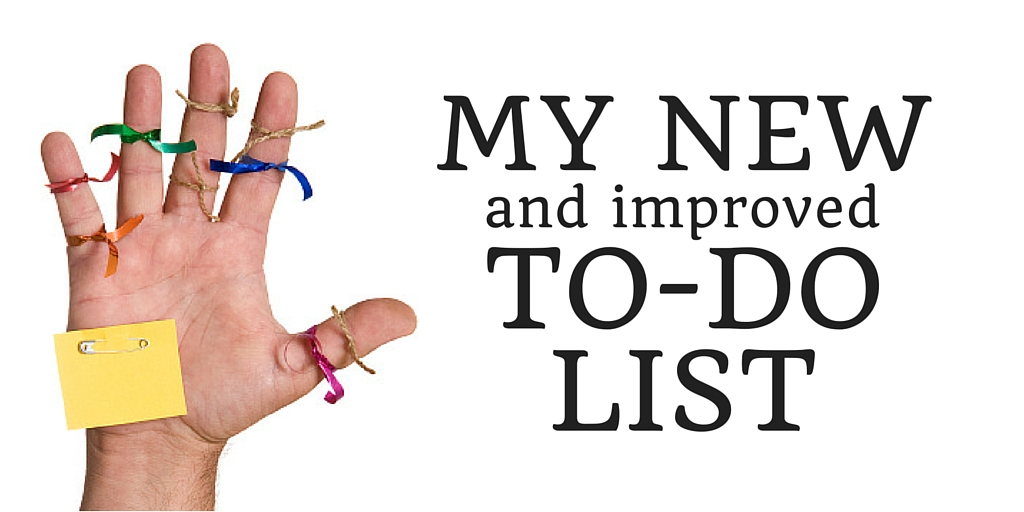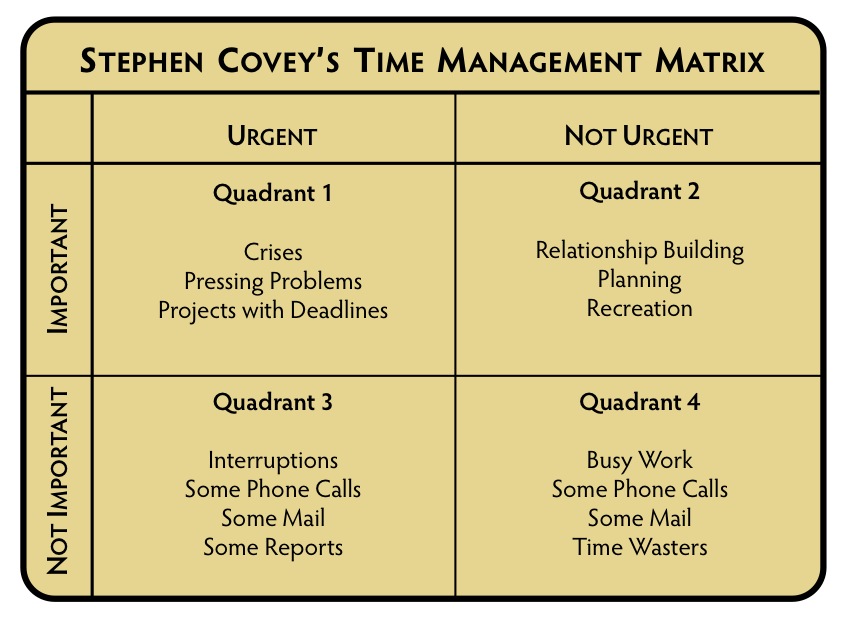My New and Improved To-Do List
 Every person has their preferred way of keeping their to-do list, but what most systems don’t have is a way of defining what item gets priority. Is your list arranged by importance, deadlines, or what’s easiest to do? The danger of not accounting for priority is that you might think you had a productive day, when you actually didn’t gain any ground on your most important assignments.
Every person has their preferred way of keeping their to-do list, but what most systems don’t have is a way of defining what item gets priority. Is your list arranged by importance, deadlines, or what’s easiest to do? The danger of not accounting for priority is that you might think you had a productive day, when you actually didn’t gain any ground on your most important assignments.
I recently adopted a new way of tracking my tasks that is based on Stephen Covey’s third habit in his popular book called The 7 Habits of Highly Effective People. In order to “put first things first” Covey suggests using four quadrants to organize your responsibilities. I have been familiar with this concept for years, but had assumed his method worked best for big picture thinking and large project management. What I have found is that it works just as effectively for weekly to-do lists.
Covey’s Time Management Matrix captures how people spend time. The two defining factors are urgency and importance. Urgent matters require immediate attention, such as an approaching deadline or a ringing phone. Urgent things are usually visible and they act on us.
Conversely, importance has to do with results. You can be assured that something is important if it contributes to your mission or the goals that have been given highest priority.
As a general rule, we react to urgent matters, but important matters require us to act.
Take a look at the four quadrants below and think about how much time you spend in each quadrant.
 Here is Covey’s overarching principle: “Effective people stay out of Quadrant 3 and 4 because, urgent or not, they aren’t important. They also shrink Quadrant 1 down to size by spending more time in Quadrant 2.”
Here is Covey’s overarching principle: “Effective people stay out of Quadrant 3 and 4 because, urgent or not, they aren’t important. They also shrink Quadrant 1 down to size by spending more time in Quadrant 2.”
But how can we do this? It wouldn’t be healthy to radically alter your approach to time management overnight, but there are gradual steps you can take to use your time more effectively.
1. Borrow time from Quadrants 3 and 4. At first, you won’t be able to drop the demands that fall in Quadrant 1 because the urgent and important matters will keep demanding your attention. That means the only way to focus more time in Quadrant 2 is to take time from Quadrants 3 and 4. Thankfully, as you continue to invest in Quadrant 2 activities, you will begin reaping more time because the noise from Quadrant 1 will begin to fade as a result of working on important priorities and preventative measures. Covey calls this feeding opportunities and starving problems.
2. Assign a quadrant to each item on your to-do list. I often tackle the easy things on my list first, like responding to emails and returning phone calls. But when I see what quadrant these tasks fall into, I feel permission to focus on more important responsibilities. You can’t neglect everything in Quadrant 3 forever, but you can delay your activity there and spend your best time on more important matters.
3. Use one list. As someone whose desk is often littered with notes and reminders, this is my biggest growth area! I write things down because I don’t want to forget an assignment. But the danger of this practice is failing to give a task a priority level. The answer is to use one list to categorize everything in a quadrant. This will give you the assurance that it won’t be forgotten and that it will also receive a much-needed priority level.
4. Review your quadrant lists. While each quadrant is static, your lists shouldn’t be. For example, after you complete a Quadrant 1 item, you’ll likely want to list some Quadrant 2 follow up tasks to ensure that you aren’t bombarded by another Quadrant 1 crisis in the future. Also, you won't want to delay a Quadrant 3 item for too long or else it may become a Quadrant 1 crisis. Keep your list visible and editable.
When you leverage the bulk of your energy to focus on tasks in Quadrants 1 and 2, you will find that you are organizing and executing around your priorities. This is the essence of what time management hopes to achieve and this goal should be both important and urgent to all of us.
- Keith Reed
